The Invisible Man vs. The Human Fly Blu-ray Movie
HomeThe Invisible Man vs. The Human Fly Blu-ray Movie 
Arrow | 1957 | 96 min | Unrated | Mar 16, 2021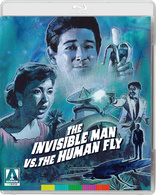
Price
Movie rating
6 | / 10 |
Blu-ray rating
| Users | 0.0 | |
| Reviewer | 3.0 | |
| Overall | 3.0 |
Overview
The Invisible Man vs. The Human Fly (1957)
A ruthless serial killer with a peculiar method of stalking and killing his victims comes face to face with a police officer turned invisible by a scientific experiment. Who will emerge triumphant?
Starring: Ryūji Shinagawa, Yoshirō Kitahara, Junko Kanō, Ikuko Mōri, Jōji TsurumiDirector: Mitsuo Murayama
| Foreign | Uncertain |
| Sci-Fi | Uncertain |
| Crime | Uncertain |
| Fantasy | Uncertain |
Specifications
Video
Video codec: MPEG-4 AVC
Video resolution: 1080p
Aspect ratio: 1.37:1
Original aspect ratio: 1.37:1
Audio
Japanese: LPCM Mono
Subtitles
English
Discs
Blu-ray Disc
Single disc (1 BD)
Playback
Region A (B, C untested)
Review
Rating summary
| Movie | 3.0 | |
| Video | 2.5 | |
| Audio | 3.0 | |
| Extras | 1.0 | |
| Overall | 3.0 |
The Invisible Man vs. The Human Fly Blu-ray Movie Review
Reviewed by Jeffrey Kauffman April 5, 2021 Note: This film is available on Blu-ray as part of The Invisible Man Appears / The Invisible Man vs The Human Fly.
For all of the frankly awe inspiring magic that modern day CGI has brought to the film world, theres really nothing to match the wonder that is
generated by watching an older movie like Universals 1933 The
Invisible Man (and its many follow ups, as aggregated in The Invisible Man: Complete Legacy Collection). With decades of special effects brilliance having
occurred
in the interim, from our 21st century vantage point, its still absolutely remarkable to think that the often mind boggling effects featured in the first
Universal film built around the H.G. Wells
classic came only four years after the advent of talkies! There are a number of fascinating sources those interested can consult to find
out
how some of the more memorable effects were created, but the bottom line is, even after reading about the techniques utilized, the resultant
effects
are
still generally gobsmacking (to use an appropriately British term, given Wells' country of origin), especially when considering the still nascent
technologies available to technicians of the early 1930s. The
Invisible
Man was a major hit for Universal, and it has of course spawned a litany of imitators through the years (including Universals own 2020 The Invisible Man), but even diehard film fans may be
unaware of the two Japanese entries Arrow has collected in this new release. The cheekily titled The Invisible Man Appears from 1949
and
the kind of bizarrely titled The Invisible Man vs. The Human Fly from 1957 may in fact have no connection other than their titular
references
to a largely unseen focal character, but they prove that the special effects wizards in Japan had obviously studied Universals groundbreaking modes
of
making the invisible, well, visible.
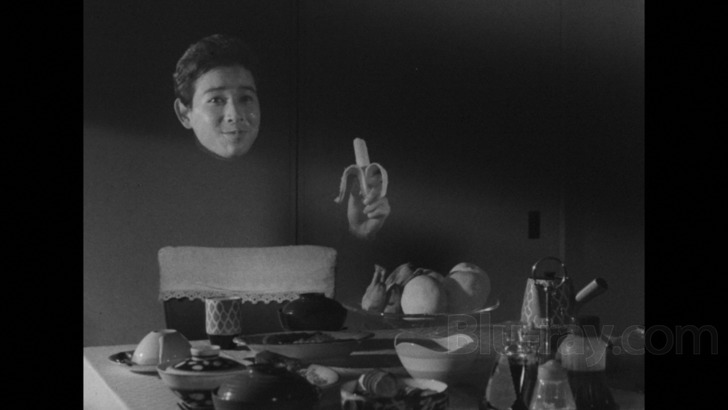
Considering its emphasis on characters who can shrink to insect size to achieve their (in some cases villainous) goals, The Invisible Man vs. The Human Fly might have just as well be named The Invisible Man vs. Ant-Man (and, yes, that's a joke). In fact, the whole invisibility angle kind of takes a back seat to other elements in this film, which is unrelated to The Invisible Man Appears. There are instead some rather interesting subtexts woven into what is in essence almost a police procedural, as the good guys chase after a seemingly invisible mad murderer who appears out of nowhere (with a mysterious buzzing sound), strikes his victims down, and then disappears just as readily. In case anyone is wondering, that villain is not the invisible man of the film's title, but rather its human fly.
This 1957 film seems more willing to get into some kind of subtle sociopolitical issues, including overt references to radiation poisoning and perceived war crimes, that place it securely in an era of Japan coming out from under the ostensible thumb of American involvement in the wake of World War II. There are relatively few of the "reveal" effects that made both the 1933 Universal film and even The Invisible Man Appears crackle with some energy, but as weird as it may sound from its ridiculous title, The Invisible Man vs. The Human Fly actually has a bit more on its mind than might initially be, um, apparent.
The Invisible Man vs. The Human Fly Blu-ray Movie, Video Quality 
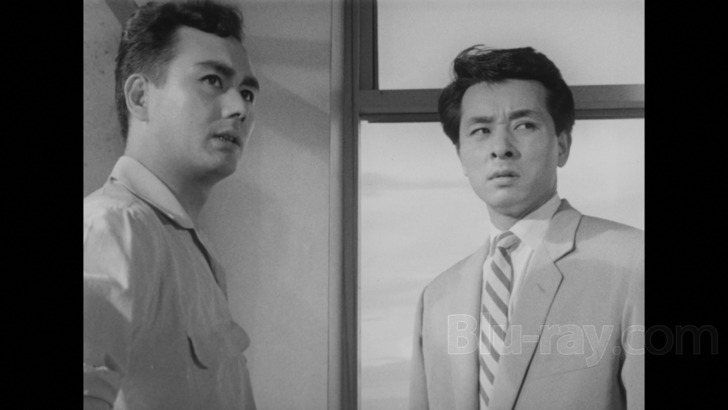
The Invisible Man vs. The Human Fly is presented on Blu-ray courtesy of Arrow Video with an AVC encoded 1080p transfer in 1.37:1. The film begins with the following disclaimer (which can be seen in the sixth screenshot included in the The Invisible Man Appears / The Invisible Man vs The Human Fly Blu-ray review):
The Invisible Man Appears and The Invisible Man vs. The Human Fly are presented from the best surviving film elements, which in both cases are 16mm exhibition prints. As a result, both transfers feature anomalies like picture weaving, scratches and exposed film edges that we felt could not be effectively repaired without further compromising the integrity of the original image.This film looks considerably better and more consistent than The Invisible Man Appears, though there are still some source based issues. This presentation offers generally better looking contrast, even in some of the effects sequences, and detail levels are also noticeably better throughout, though understandably limited at times due to the smaller format source element. Close-ups in particular often look surprisingly good. There is still quite a bit of damage that can be spotted, including expected issues like dirt, scratches and reel change markers. My score is 2.75.
We sincerely hope these issues do not affect your enjoyment of these two rare pieces of tokusatsu history, available outside Japan for the first time.
The Invisible Man vs. The Human Fly Blu-ray Movie, Audio Quality 
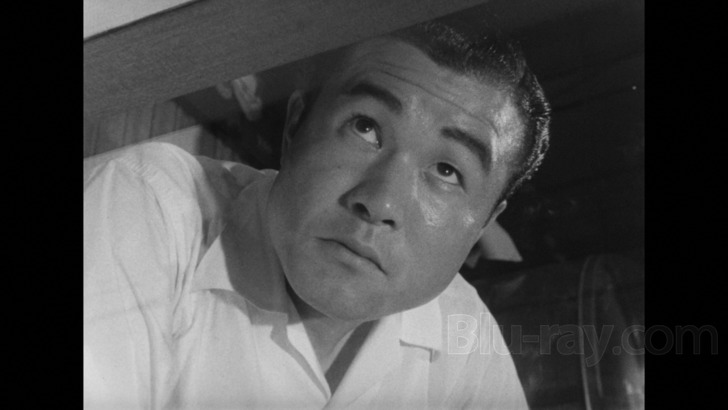
The Invisible Man vs. The Human Fly features an LPCM Mono track in the original Japanese. As with the video side of things, audio is at least marginally improved here when compared to The Invisible Man Appears. This film has a rather interesting mix of scoring and sound effects, and I for one am going to try to find out more about composer Tokujiro Okubo, since this film seems to offer some proto-electronic effects as well as what might either be a Theremin or a good Yma Sumac impersonator. The score, which tends to traffic in the upper registers, can sound a little too bright at times, but the overall effect is interesting. Dialogue is rendered cleanly and clearly. Optional English subtitles are available.
The Invisible Man vs. The Human Fly Blu-ray Movie, Special Features and Extras 
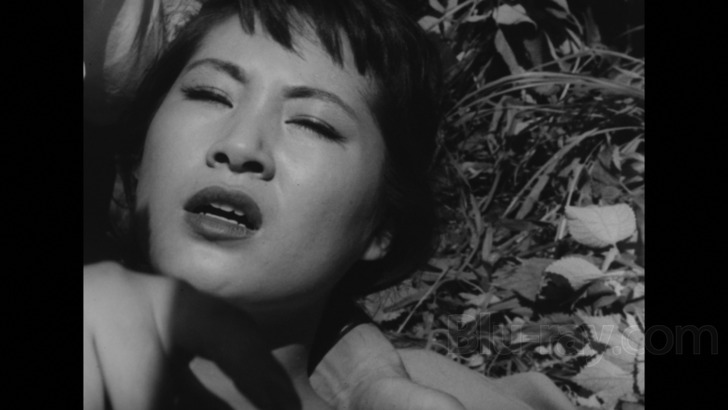
Arrow has packaged both films together on one BD-50, with the following supplemental features:
- Transparent Terrors (HD; 24:40) is another enjoyable discussion by Kim Newman, who offers a (sub?)genre wide examination of various Invisible Man adaptations.
- The Invisible Man Appears Theatrical Trailer (HD; 2:38)
- Image Galleries
- The Invisible Man Appears (HD; 4:00)
- The Invisible Man vs. The Human Fly (HD; 2:50)
The Invisible Man vs. The Human Fly Blu-ray Movie, Overall Score and Recommendation 
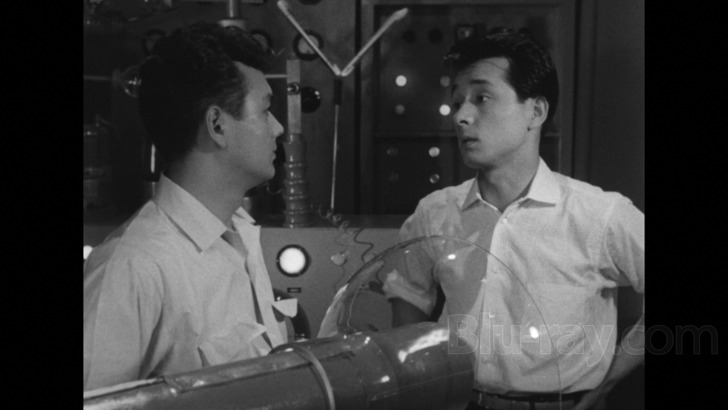
There are a number of things in this film that just kind of made me laugh at times, including one character I nicknamed "Man Looking Up Guy", since he repeatedly stumbles across victims and then gazes skyward to try to find out who did the murdering (while emitting grunt like dialogue insisting the dying victims identify their killer). This film's out of nowhere musical sequence is also kind of delightful. But as mentioned above, there are actually some surprisingly nuanced elements at play just beneath the surface of The Invisible Man vs. The Human Fly, at least for those willing to look for them. Video is not optimal, as Arrow's own disclaimer mentions, but is better than on the first film in this set, and audio is similarly also at least marginally better. The Kim Newman supplement is also enjoyable, for those who are considering a purchase.
Similar titles
Similar titles you might also like
(Still not reliable for this title)

The Invisible Man Appears
Tōmei ningen arawaru
1949

Dead or Alive: Final
2002

School in the Crosshairs
The Aimed School
1981

Moon Child
El nińo de la luna
1989

Gold
Oro
1934

Gamera: Super Monster
Uchu kaijū Gamera
1980

Gamera vs. Zigra
Gamera tai Shinkai kaijū Jigura
1971

Gamera vs. Jiger
Gamera tai Daimaju Jaiga
1970

Gamera vs. Guiron
Gamera tai daiakuju Giron
1969

Gamera vs. Barugon
Daikaijū kettō: Gamera tai Barugon
1966

Gamera vs. Viras
Gamera tai uchu kaijū Bairasu / Destroy All Planets
1968

Gamera
Daikaijū Gamera / Gamera, the Giant Monster
1965

Gamera vs. Gyaos
Daikaijū kūchūsen: Gamera tai Gyaosu
1967

Stray Cat Rock: Delinquent Girl Boss
1970

Howl from Beyond the Fog
狭霧の國 / Second Printing
2019

Godzilla 1984
ゴジラ / Gojira / The Return of Godzilla
1984

Stray Cat Rock: Wild Jumbo
1970

Varan the Unbelievable
Daikaiju Baran
1958

Yakuza Weapon
Gokudō heiki
2011

Godzilla on Monster Island
地球攻撃命令 ゴジラ対ガイガン / Chikyū kogeki meirei: Gojira tai Gaigan / Godzilla vs. Gigan
1972